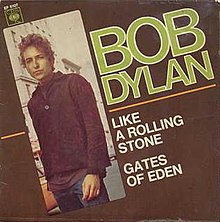Gates of Eden (song)
| "Gates of Eden" | ||||||||||||
|---|---|---|---|---|---|---|---|---|---|---|---|---|
 |
||||||||||||
| Single by Bob Dylan | ||||||||||||
| from the album Bringing It All Back Home | ||||||||||||
| A-side | "Like a Rolling Stone" | |||||||||||
| Released | July 20, 1965 | |||||||||||
| Format | 7" single | |||||||||||
| Recorded | January 15, 1965 at Columbia Recording Studios, New York City | |||||||||||
| Genre | Folk | |||||||||||
| Length | 5:48 | |||||||||||
| Label | Columbia | |||||||||||
| Writer(s) | Bob Dylan | |||||||||||
| Producer(s) | Tom Wilson | |||||||||||
|
||||||||||||
| 11 tracks |
|---|
|
"Gates of Eden" is a song by Bob Dylan that appears on his fifth studio album Bringing It All Back Home, released on March 22, 1965 by Columbia Records. It was also released as a single as the B-side of "Like a Rolling Stone". Dylan plays the song solo, accompanying himself on acoustic guitar and harmonica. It is considered one of Dylan's most surreal songs. In a 2005 Mojo magazine poll of its writers and various well-known musicians, "Gates of Eden" was ranked 69th among Dylan's 100 greatest songs.
According to Dylan biographer Clinton Heylin, "Gates of Eden" was written in late June or July 1964. Based on the clean draft of the song, Heylin believes that Dylan did not need to struggle as much writing this song as he did with "Mr. Tambourine Man" and "Chimes of Freedom", which were written a short time earlier. In the draft, eight of the song's nine verses are complete and only two lines were revised for the final version. The final verse in the draft is incomplete, consisting of just two lines:
The song was recorded in a single take on January 15, 1965, the same day as the other songs of side 2 of Bringing It All back Home—"Mr. Tambourine Man", "It's Alright, Ma (I'm Only Bleeding)" and "It's All Over Now, Baby Blue"—were recorded.Tom Wilson was the producer.
The song's dream imagery is reminiscent of William Blake's images in and "The Keys of the Gates". The abstract poetry inspires a nightmarish vision. Each verse provides a separate description of a decaying society. Although the song's title seems to provide hope of paradise, there is no paradise in the place this song describes. Rather, the imagery evokes corruption and decay. Dylan's ominous delivery of the last line of each verse followed by a sour harmonica note emphasizes that this Eden cannot be reached. Oliver Trager interprets "Gates of Eden" as Dylan's declaration that "blind belief in a forgiving afterlife is the ultimate lie because it creates complacency in this one." Music critic Robert Shelton has a similar interpretation, that "belief in life after death without worry or care is the ultimate myth because it takes us past the ugliness in life." Carolyn Bliss has noted about the song that "Eden is inside. Any other paradise is a sham, and pursuit of it potentially deadly to the spirit."
...
Wikipedia
